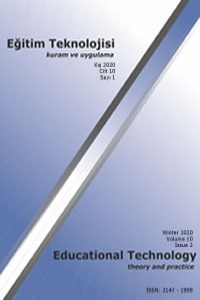Öz
Kaynakça
- Bowen, G. A. (2009). Document analysis as a qualitative research method. Qualitative Research Journal9, 9(2), 27–40. https://doi.org/10.3316/qrj0902027
- DeBoer, J., Ho, A. D., Stump, G. S., & Breslow, L. (2014). Changing “Course”: Reconceptualizing Educational Variables for Massive Open Online Courses. Educational Researcher, March(43), 74–84. https://doi.org/10.3102/0013189X14523038
- Driscoll, M. (2010). Web-based training: Creating e-learning experiences. John Wiley & Sons.
- Hew, K. F., & Cheung, W. S. (2014). Students’ and instructors’ use of massive open online courses (MOOCs): Motivations and challenges. Educational Research Review, 12, 45–58. https://doi.org/10.1016/j.edurev.2014.05.001
- Herman, R. L. (2012). Letter from the Editor-in-Chief: the MOOCs are coming. The Journal of Effective Teaching, 12(2), 1-3.
- Hoy, M. B. (2014). MOOCs 101: an introduction to massive open online courses. Medical Reference Services Quarterly, 33(1), 85–91. https://doi.org/10.1080/02763869.2014.866490
- Kizilcec, R. F., Piech, C., & Schneider, E. (2013). Deconstructing Disengagement : Analyzing Learner Subpopulations in Massive Open Online Courses. Lak ’13, 10. https://doi.org/10.1145/2460296.2460330
- Kop, R., Fournier, H., & Mak, J. S. F. (2011). A pedagogy of abundance or a pedagogy to support human beings? Participant support on massive open online courses. The International Review of Research in Open and Distributed Learning, 12(7), 74-93.
- Margaryan, A., Bianco, M., & Littlejohn, A. (2015). Instructional quality of massive open online courses (MOOCs). Computers & Education, 80, 77-83.
- Pasha, A., Abidi, S. H., & Ali, S. (2016). Challenges of offering a MOOC from an LMIC, 17(6).
- Reutemann, J. (2016). Differences and Commonalities–A comparative report of video styles and course descriptions on edX, Coursera, Futurelearn and Iversity. Proceedings of the European Stakeholder summit on experiences and best practices in and around MOOCs (EMOOCS 2016), 383-392.
- Siemens, G. (2013). Massive Open Online Courses: Innovation in Education? Open Educational Resources: Innovation, Research and Practice, 1833, 5–16.
- Sweller, J. (2006). Why understanding instructional design requires an understanding of human cognitive evolution. Web-based learning: Theory, research and practice, 279-294.
Öz
Bu çalışmanın amacı ABD, Avrupa ve Türkiye merkezli
İHAK’ların (İnternet Üzerinden Herkese Açık Ders – MOOC) yapısal olarak
karşılaştırılmasıdır. Bu amaç kapsamında belirtilen bölgelerde hizmet veren
ikişer adet (toplam altı) İHAK sağlayıcıdan sayısal, sözel ve bilgisayar
bilimleri alanından birer ders seçilerek (toplam 18) kullanılan materyal,
ortam, etkinlik türü, yapılandırma, katılım türü, zamanlama ve değerlendirme
etkinliklerine göre kıyaslı olarak incelenmiştir. Çalışmada var olan özellikler
‘1’ bulunmayan özellikleri ise ‘0’ şeklinde kodlanmış ve her kategorideki
toplam puanlar kıyaslanarak analiz edilmiştir. Bulgular incelendiğinde en çok
kullanılan materyalin video ve metinler olduğu, animasyon ve simülasyonlara ise
çok az yer verildiği görülmüştür. En yaygın içerik platformunun İHAK’ların
kendi yapılandırdıkları ortam ve forumlar olduğu, bununla beraber wikilere çok
az yer verildiği bulunmuştur. Etkinliklerin izleme, okuma ve alıştırma
ağırlıklı olduğu, bununla beraber tüm İHAK’ların bireysel ilerlemeye yönelik
katı şekilde yapılandırılmış olduğu tespit edilmiştir. İncelenen tüm derslerin
asenkron boyuta sahip olmakla beraber çok azının senkron derslere yer verdiği
görülmüştür. Değerlendirme boyutunda ise en çok kullanılan yöntemin çoktan
seçme ve kısa cevaplı sorular olduğu görülmüştür. Konu alanına göre çok büyük
farklılıklar göstermeyen İHAK’lar, bölge bazında incelendiğinde Türkiye
merkezli İHAK’ların ABD ve Avrupa merkezli İHAK’lara göre bazı eksikliklere ve
kültürel anlamda farklara sahip olduğu tespit edilmiştir.
Kaynakça
- Bowen, G. A. (2009). Document analysis as a qualitative research method. Qualitative Research Journal9, 9(2), 27–40. https://doi.org/10.3316/qrj0902027
- DeBoer, J., Ho, A. D., Stump, G. S., & Breslow, L. (2014). Changing “Course”: Reconceptualizing Educational Variables for Massive Open Online Courses. Educational Researcher, March(43), 74–84. https://doi.org/10.3102/0013189X14523038
- Driscoll, M. (2010). Web-based training: Creating e-learning experiences. John Wiley & Sons.
- Hew, K. F., & Cheung, W. S. (2014). Students’ and instructors’ use of massive open online courses (MOOCs): Motivations and challenges. Educational Research Review, 12, 45–58. https://doi.org/10.1016/j.edurev.2014.05.001
- Herman, R. L. (2012). Letter from the Editor-in-Chief: the MOOCs are coming. The Journal of Effective Teaching, 12(2), 1-3.
- Hoy, M. B. (2014). MOOCs 101: an introduction to massive open online courses. Medical Reference Services Quarterly, 33(1), 85–91. https://doi.org/10.1080/02763869.2014.866490
- Kizilcec, R. F., Piech, C., & Schneider, E. (2013). Deconstructing Disengagement : Analyzing Learner Subpopulations in Massive Open Online Courses. Lak ’13, 10. https://doi.org/10.1145/2460296.2460330
- Kop, R., Fournier, H., & Mak, J. S. F. (2011). A pedagogy of abundance or a pedagogy to support human beings? Participant support on massive open online courses. The International Review of Research in Open and Distributed Learning, 12(7), 74-93.
- Margaryan, A., Bianco, M., & Littlejohn, A. (2015). Instructional quality of massive open online courses (MOOCs). Computers & Education, 80, 77-83.
- Pasha, A., Abidi, S. H., & Ali, S. (2016). Challenges of offering a MOOC from an LMIC, 17(6).
- Reutemann, J. (2016). Differences and Commonalities–A comparative report of video styles and course descriptions on edX, Coursera, Futurelearn and Iversity. Proceedings of the European Stakeholder summit on experiences and best practices in and around MOOCs (EMOOCS 2016), 383-392.
- Siemens, G. (2013). Massive Open Online Courses: Innovation in Education? Open Educational Resources: Innovation, Research and Practice, 1833, 5–16.
- Sweller, J. (2006). Why understanding instructional design requires an understanding of human cognitive evolution. Web-based learning: Theory, research and practice, 279-294.
Ayrıntılar
| Birincil Dil | Türkçe |
|---|---|
| Bölüm | Makaleler |
| Yazarlar | |
| Yayımlanma Tarihi | 31 Ocak 2020 |
| Yayımlandığı Sayı | Yıl 2020 Cilt: 10 Sayı: 1 |


